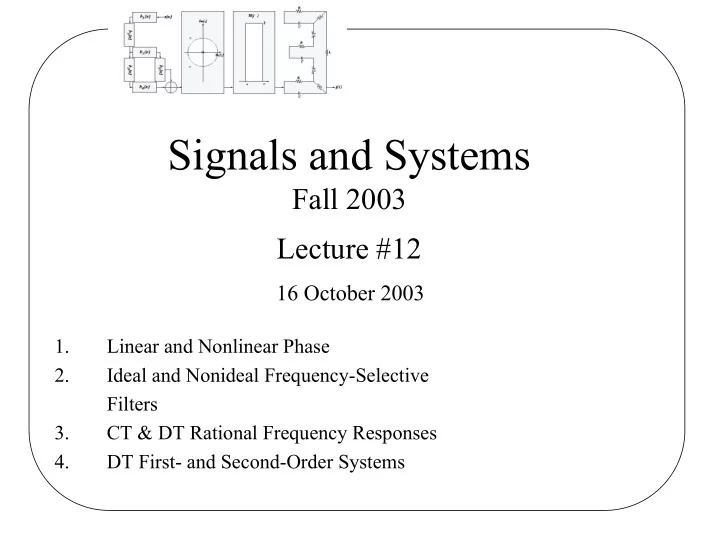

Signals and Systems Fall 2003 Lecture #12 16 October 2003 1. Linear and Nonlinear Phase 2. Ideal and Nonideal Frequency-Selective Filters 3. CT & DT Rational Frequency Responses 4. DT First- and Second-Order Systems
Linear Phase CT Result: Linear phase ⇔ simply a rigid shift in time, no distortion Nonlinear phase ⇔ distortion as well as shift DT Question:
All-Pass Systems CT DT
Demo: Impulse response and output of an all-pass system with nonlinear phase
How do we think about signal delay when the phase is nonlinear? Group Delay φ
Ideal Lowpass Filter CT ← → ⎯ Noncausal h ( t <0) ≠ 0 • • Oscillatory Response — e.g. step response Overshoot by 9%, Gibbs phenomenon
Nonideal Lowpass Filter • Sometimes we don’t want a sharp cutoff, e.g. Often have specifications in time and frequency domain ⇒ Trade-offs • Step response Freq. Response
CT Rational Frequency Responses CT: If the system is described by LCCDEs, then Prototypical — First-order system, has only one Systems energy storing element, e.g. L or C — Second-order system, has two energy storing elements, e.g. L and C
DT Rational Frequency Responses If the system is described by LCCDE’s (Linear-Constant-Coefficient Difference Equations), then
DT First-Order Systems
Demo: Unit-sample, unit-step, and frequency response of DT first-order systems
DT Second-Order System decaying oscillations
Demo: Unit-sample, unit-step, and frequency response of DT second-order systems
Recommend
More recommend